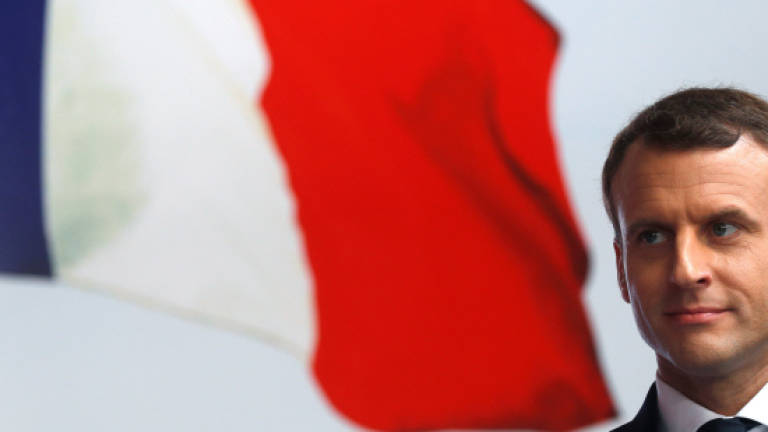Anger on the barricades at France's student sit-ins

SAINT-DENIS: Behind the graffiti-smeared barricades at universities across France, there is simmering anger among students staging sit-ins against President Emmanuel Macron – and a good deal of eye-rolling from some of their classmates.
Paris 8, in the northern suburb of Saint-Denis, is one of four campuses almost completely shut down for weeks over planned higher education reforms, while scattered faculty buildings up and down France are under similar 'occupation'.
Just as exam season begins, Paris 8 has been transformed into something resembling an anarchist protest camp, the walls covered with bright paint proclaiming everything from a feminist revolution to support for the Kurds.
"If you want to speak out, you need to shout louder," read lyrics from local rapper Sofiane, scrawled in massive letters across the tables of a lecture hall graffitied beyond recognition.
For the far-left students who dominate the sit-ins, the protests are about much more than education – they have echoes of the momentous French university sit-ins that spurred a social revolution exactly 50 years ago, in May 1968.
"It's a fight against the education reforms but also a much broader fight," says Zoe, a 19-year-old history student who like others was willing to give only a first name.
Soft-spoken with a buzzcut, she says she's here to rise up "against the police and state repression, and the general economic system".
But the protesters are far from a majority at Paris 8 and elsewhere. Many students are frustrated at the revolutionary zeal of their classmates, not least because it is playing havoc with exam schedules.
"I just want to take my test," one student mutters under her breath, drowned out by a protester chanting through a megaphone: "Whose uni? Our uni!"
Protests blocked 700 students from sitting an exam in Strasbourg last week, and in Nancy police had to intervene to allow students to get into an English test.
Some of the blockades have been cleared by riot police. Elsewhere, university chancellors are having to find alternative venues for exams off-campus, or else hold them online, delay them or grade students on their coursework instead.
Political dynamite
At present, anyone with a French high school diploma can go on to study any course they like at a public university.
With tuition paid almost entirely by the state – the average student paid 189 euros (RM 887.42) last year – the system's proponents hold it up as a beacon of egalitarianism.
Yet Macron and other reformists say the policy has brought France's higher education system to breaking point.
Almost all students take their high school exams now, and almost 80% pass – a figure that has risen steadily, and exponentially, since the 1950s.
As a consequence, universities are badly overstretched. First-year lectures are crammed and students complain of nonexistent support.
Opponents argue that France wastes millions of euros of taxpayers' money each year by letting students attempt degrees in subjects they're not very good at, contributing to high dropout rates and frequent repeats after failed exams.
Some 60% fail to finish their degree within four years.
To help ease these problems, Macron wants universities to be allowed to set admissions criteria for oversubscribed courses and, for weaker students, make offers conditional on them taking catch-up classes.
But academic selection – even in this limited form – remains hugely politically sensitive in France, half a century after it became one of the driving issues behind the May '68 protests.
Teachers on strike too
Critics of France's education system argue it is already elitist, with a separate tier of highly selective universities, the 'grandes ecoles', producing the graduates who go on to dominate business and politics.
But Paris 8 sits in one of the poorest regions of France, and even students who oppose the campus blockade are sceptical that Macron's reforms will be good for high-rise immigrant suburbs like their own.
"I'm against the law, but at the same time, I'm against the blockade. We can make ourselves heard in other ways," said Louise, a 19-year-old geography student.
For her, university-for-all gives poor kids who fared badly at a high school a chance to blossom – "even to become teachers themselves, to give something back to France".
And she worries that more selective education will worsen social mobility under Macron, who she already believes favours the rich with business-friendly reforms like tax cuts for the wealthy.
"The president is trying to turn France into America, to create an unbalance between the social classes," she said.
Many staff at Paris 8 have joined the student protest movement, going on strike, cancelling exams and in some departments declaring that all students will be given the same year-end grade in protest against the reforms.
Not everyone agrees with that idea, but those who oppose the movement are nervous about speaking out.
"It means throwing out the window everything that's been done this year," said a teacher in the art department, who wished to remain anonymous.
"It's a disservice to the students." — AFP